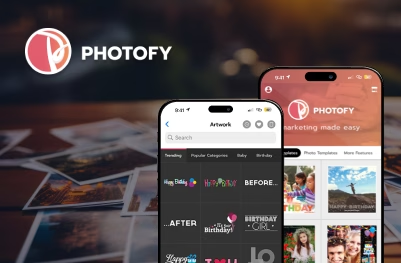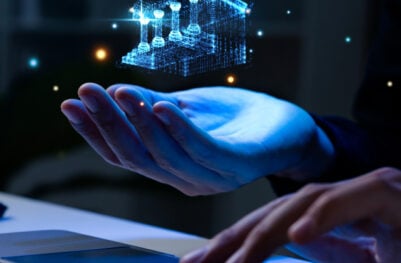- Developers
- Developer Blog
- Blockchain Development
- What is a Blockchain Developer?

profile

By Aran Davies
Verified Expert
9 years of experience
Aran Davies is a full-stack software development engineer and tech writer with experience in Web and Mobile technologies. He is a tech nomad and has seen it all.
Are you wondering what a blockchain developer is and what skills you need to become one? Read on! This guide explores exactly this topic.
In this article
- What is a blockchain developer: job description
- Responsibilities of a blockchain developer
- Skills and competencies that blockchain developers need
- Frequently Asked Questions on blockchain development
Once an emerging tech, the blockchain market size is projected to increase to $943 billion by 2032.
Blockchain developers design, code, test, and deploy blockchain-based applications. They have specific job descriptions and responsibilities. Blockchain developers need specific skills and competencies. Let’s discuss this step by step.
What is a blockchain developer: job description
Blockchain developers study the requirements of an organization, and they design a blockchain-based solution. They design the blockchain network and applications. Blockchain developers code and test the applications. Many experienced blockchain developers perform blockchain code reviews. After reviews and testing, blockchain developers deploy the blockchain network and applications.
Responsibilities of a blockchain developer
Blockchain developers typically have the following responsibilities:
- Analyzing the organizational requirements;
- Determining the appropriate blockchain development approach, e.g., public vs private blockchain;
- Choosing the appropriate blockchain development platform, e.g., Ethereum;
- Designing blockchain applications;
- Documenting technical solutions;
- Coding blockchain applications;
- Analyzing and resolving bugs and action items arising out of code reviews;
- Testing blockchain applications;
- Deploying blockchain apps;
- Maintaining blockchain applications;
- Reporting the status of blockchain development projects;
- Collaborating with the larger team in the organization.
Skills and competencies that blockchain developers need
Blockchain developers need the following skills and competencies:

Get a complimentary discovery call and a free ballpark estimate for your project
Trusted by 100x of startups and companies like
Generic blockchain skills
Competent blockchain developers need a sound knowledge of the following:
- P2P networking;
- Modern cryptography;
- Cryptographic hash functions;
- Data encryption standards;
- Different blockchain consensus algorithms.
Public blockchain development skills
Blockchain developers might need skills in platforms like Ethereum, Polkadot, and BNB Smart Chain. Ethereum is the most popular among them. Ethereum blockchain developers need the following:
- Familiarity with EVM (Ethereum Virtual Machine), the development platform on the Ethereum blockchain;
- Languages like Solidity or Vyper for developing Ethereum smart contracts;
- Experience in developing Ethereum DApps (Decentralized Apps);
- Experience in Ethereum blockchain development tools like Web3.js, Truffle suite of tools, and the Remix IDE;
- Familiarity with test blockchain networks like Sepolia;
- Knowledge of scaling Ethereum DApps.
Enterprise blockchain development skills
Depending on the choice of Enterprise blockchain framework, blockchain developers might need to know Hyperledger Fabric, R3 Corda, or ConsenSys Quorum. The skills vary accordingly.
Hyperledger Fabric developers need to know any one of Java, JavaScript, Node.js, or Golang for blockchain development. R3 Corda blockchain developers need to know JVM (Java Virtual Machine)-compatible languages like Java or Kotlin. ConsenSys Quorum is based on Ethereum, therefore, developers need Solidity skills.
Software engineering and software development process skills
Blockchain developers need a sound knowledge of the following:
Hire expert developers for your next project
1,200 top developers
us since 2016
- Software development methodologies and lifecycle models;
- Software architecture;
- UI design principles;
- Code review;
- Testing and DevOps processes, methods, and tools.
Competencies
Blockchain developers need the following competencies:
- Passion for excellence;
- Commitment to the project requirements;
- An ability to understand the perspective of end-users;
- Communication skills;
- Collaboration;
- Teamwork;
- An ability to see the bigger picture.
Conclusion
Blockchain developers use specific skills and competencies to develop, test, and implement blockchain networks and applications.
DevTeam.Space offers a comprehensive range of blockchain development services to create, test, deploy, and maintain all kinds of blockchain-based solutions.
Our expert blockchain developers have helped our clients build a range of custom blockchain solutions such as cryptocurrencies, blockchain-based supply chain apps, smart contracts, DApps, and more.
If you need professional assistance with your blockchain project, fill out a short specification form to hire blockchain developers from DevTeam.Space.
Hire expert developers for your next project
Frequently Asked Questions on blockchain development
Blockchain has many utilities, e.g., cryptocurrencies, DeFi (Decentralized Finance) apps, NFT (Non-Fungible Token)-based games, CBDCs (Central Bank Digital Currencies), supply chain traceability, facilitating cross-border payments and banking transactions, and digital identity management.
An Ethereum smart contract is a piece of code. It contains “If-Then-Else” statements. It transfers cryptographic assets based on conditions. Ethereum smart contracts are open-source, autonomous, immutable, and irreversible. Their executions are recorded on the Ethereum blockchain.
An Ethereum DApp is a web app with Ethereum smart contracts as the back-end. They are open-source apps, and they run on the Ethereum blockchain network. Ethereum DApps have cryptographic tokens. A consensus from the user community is needed before changing a DApp.

Alexey Semeney
Founder of DevTeam.Space
Hire Alexey and His Team To Build a Great Product
Alexey is the founder of DevTeam.Space. He is award nominee among TOP 26 mentors of FI's 'Global Startup Mentor Awards'.
Alexey is Expert Startup Review Panel member and advices the oldest angel investment group in Silicon Valley on products investment deals.


